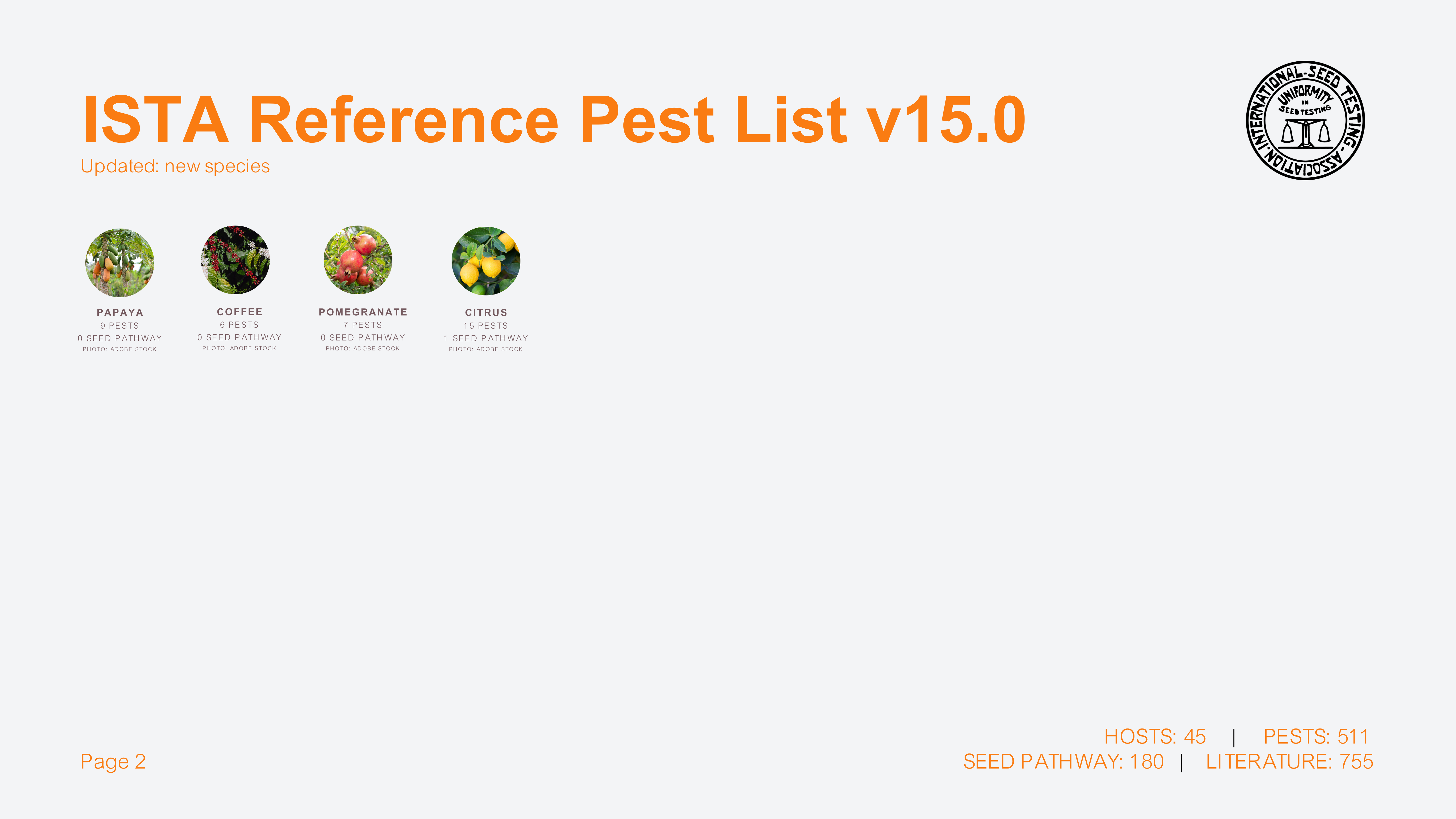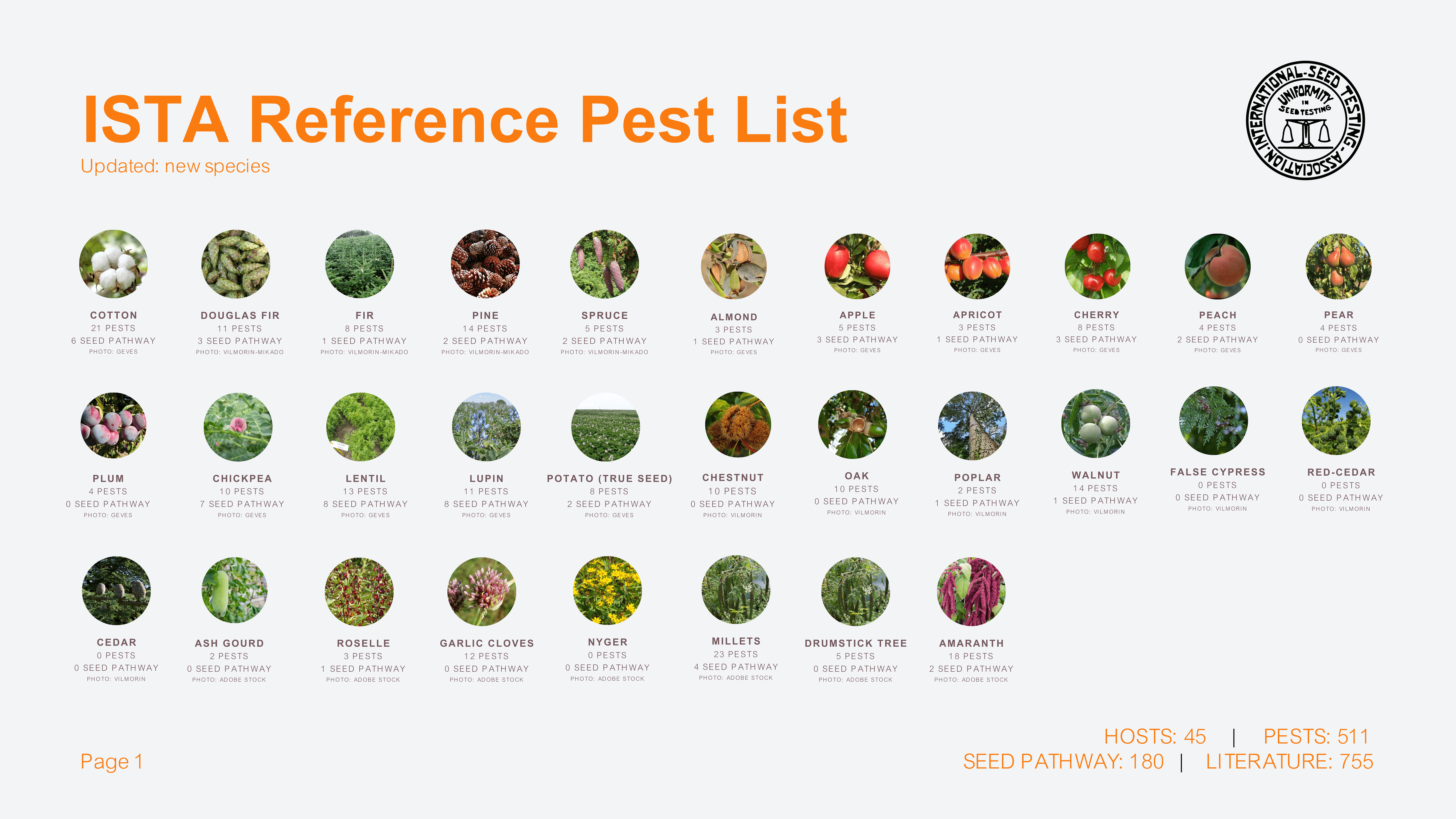ISTA Reference Pest List
Seed pathway for pest dissemination: ISTA Reference Pest List, a bibliographic resource in non-vegetable plant species.
For details on the context and methodology, please refer to Denancé and Grimault (2022), EPPO Bulletin (see here) as well as to Denancé and Malabarba (2025), in Seed Testing International, (see here).
New version (v15; release 2026-01-09): four species of the Caricaceae (Papaya), Rubiaceae (Coffee), Lythraceae (Pomegranate) and Rutaceae (Citrus) families.
A link to the ISTA Seed Heath Test Image Dababase is given if pictures of the pathogens are available.
The project covers more than 50 non-vegetable species from 25 botanical families, including cereals, legumes, oilseeds, forest trees, and fruit trees. The ISTA-RPL will be updated regularly as soon as a list is finalised.
- Updated lists (45 host species): Amaranthaceae (amaranth), Amaryllidaceae (garlic), Araucariaceae (Araucaria spp.), Asteraceae (sunflower, nyger), Brassicaceae (rapeseed), Caricaceae (papaya), Cucurbitaceae (ash gourd), Cupressaceae (false cypress, red cedar), Fabaceae (alfalfa, chickpea, lentil, lupin, soybean), Fagaceae (chestnut, oak), Juglandaceae (walnut), Lythraceae (pomegranate), Malvaceae (cotton, roselle), Moringaceae (drumstick tree), Pinaceae (cedar, Douglas firs, firs, pines, spruces), Poaceae (barley, millets, oat, rice, sorghum, triticale, wheat), Rosaceae (almond, apple, Apricot, cherry, peach, pear, plum), Rubiaceae (coffee), Rutaceae (Citrus spp.)Salicaceae (poplar), Solanaceae (potato).
- Ongoing investigations: Anacardiaceae (pistachio nut), Annonaceae (custard apple), Apiaceae (celery, coriander, dill, parlsey, parsnip), Asteraceae (safflower), Brassicaceae (rocket), Fabaceae (black wattle, peanut, red sandalwood), Ginkgoaceae (ginkgo), Lamiaceae (basil, sage), Myrtaceae (eucalyptus), Pedaliaceae (sesame), Poaceae (panicgrass), Sapindaceae (maple).
It also includes a list of pests that were included in the latest version of the Annotated list of seed-borne diseases (4th ed.; 1990), but which have no evidence to be seed-borne or seed-contaminating pests in the scientific literature. They will be regularly checked for information.
Coordinator: Nicolas DENANCÉ, Eduardo GÁLVEZ (GEVES, France)
Funding: ISTA (ISTA Reference Pest List project)
Selection and review of articles: some were initially selected by Christine HENRY and Alex JEBB (FERA, UK), Terry AVELING, Nicole JOUBERT, Godfrey KGATLE, Edgar MANGWENDE, Gloria MUKWIRIMBA and Renaan THOMPSON (University of Pretoria, South Africa). Since 2018, the scientific literature has been screening by successive people: Nicolas DENANCÉ (v1 to v9), Giulia FARINARO (v10, v11), Caroline BELLENOT (v10 to V14) and Eduardo GÁLVEZ (v15). They coordinate international experts, with recognized expertise in seed pathology from examination offices, seed companies and academic research laboratories who are involved in evaluating of the selected articles.
Validation: The ISTA Seed Health Committee checks and validates the content of the lists before its publication on the ISTA website.
Contact: If you have comments on the conclusions or new information to offer, please contact ISTA (ista.office@ista.ch). Readers are encouraged to subscribe to ISTA Newsletter to stay tuned on further updates.


